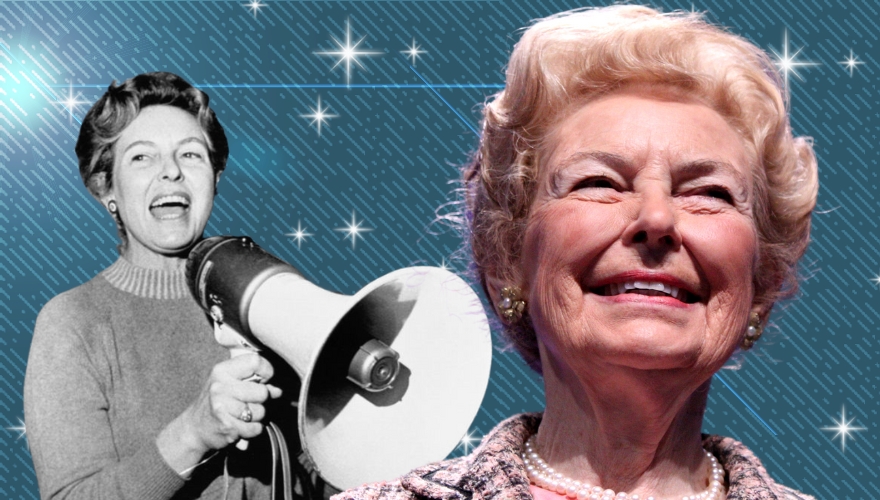In honor of Women’s History Month 2023, this is the first installment of a series of profiles of women whose work, lifestyle, and legacy have earned them the label anti-feminist.
Phyllis Schlafly opposed the absence of women from the home, turned the tides of a thriving political movement, and secured the title of the first lady of anti-feminism.
Schlafly is credited with the failure of the Equal Rights Amendment in the 1970s. Under her leadership, a nationwide grassroots campaign successfully stopped ERA from gaining enough support to become the 27th amendment of the United States Constitution. A total of 35 states ultimately backed the legislation — three short of the majority need to ratify the amendment.
Schlafly might be described as an early general in a battle against the progressive ideological current in America’s culture war. She rang alarm bells about changes in the nation’s shared concept of family, partnership, and gender roles when feminism was at its most fashionable.
Known for her intelligence and poise, Schlafly was the perfectly coifed housewife at the epicenter of change in America.
A native of Illinois, Schlafly graduated from Washington University in 1944 and earned a Master’s degree from Harvard University in 1945.
She said her 1949 marriage to lawyer Fred Schlafly saved her from “life as a working girl.” She remained active in politics through volunteer work with the Republican Party and political campaigns. She published anti-communist and conservative writings and, in 1962, became a radio commentator. She also unsuccessfully ran for Congress twice.
Her 1964 book A Choice Not an Echo was a “runaway success” that helped Barry Goldwater win the Republican nomination, according to The Atlantic. In it, Schlafly argued “a few secret kingmakers” of the Republican Party conspired to keep other conservatives from power.
The mother of six graduated law school in 1978 and took the bar in disguise in an effort to not be detected by the media.
The ERA was passed by Congress on March 22, 1972, three years before the end of the Vietnam War and 49 years after it was first introduced. More American women were working outside the home, women’s studies programs had been opened at San Diego State and Cornell University, and the Supreme Court had ruled that sex-based discrimination violated the 14th Amendment. The proposed amendment was supported by women’s liberation icons like Gloria Steinem and then-Congresswoman Bella Abzug, along with the National Organization for Women. President Richard Nixon and First Lady Pat Nixon both publicly supported the ERA.
Although initially unconcerned about the ERA, Schlafly quickly became the voice of the nation’s opposition to the 52-word amendment. She predicted its passage would be the end of the traditional family in America.
As the chairwoman of STOP ERA, Schlafly toured the country advocating against the amendment’s ratification. She said the ERA would make laws sex-neutral which would be detrimental to the American public. She hailed the proposed amendment as the “psychology of compulsion and the intolerance of those who are pushing for a gender-free society which doesn’t recognize any difference or any separation of treatment between men and women anytime, anywhere.”
For Schlafly, the ERA took away rights American women already had. It would make women eligible for the draft – a major consideration for post-Vietnam America – ending what Schlafly saw as the woman’s right not to serve in the military. Schlafly also noted the amendment’s absolutist language would end federal exemptions to anti-discrimination laws that permitted the existence of all women’s schools and colleges.
Schlafly warned the ERA would undermine state laws that obligated men, under threat of criminal consequences, to support and provide for their wives and minor children and cautioned against transferring more power to the federal government.
“Since the women are the ones who bear the babies and there’s nothing we can do about that, our laws and customs then make it the financial obligation of the husband to provide the support,” said Schlafly in March of 1973. “It is his obligation and his sole obligation. And this is exactly and precisely what we will lose if the Equal Rights Amendment is passed.”
One notable strategy employed by Schlafly and those opposed to the ERA was to bring homemade bread to every legislator while lobbying them to reject ratification.
“The feminist looks upon that as a dirty trick,” Schlafly recounted in one interview while laughing.
Over the course of her decade-long grassroots resistance, five states voted to rescind or withdraw their support for the ratification of the ERA.
Schlafly was truly despised by the feminists of her day.
Feminist activist Betty Friedan, author of The Feminine Mystique, called Schlafly a “traitor” to her sex, “an Aunt Tom.”
“I’d like to burn you at the stake,” Friedan yelled at Schlafly during a debate in May of 1973 at the University of Illinois.
Schlafly, who had told Friedan she was the “unhappiest woman I have ever met,” was unphased. She said the feminist’s comments showed “the intemperate nature of proponents of ERA.” (It is worth noting that these women squared off in other debates about gender-neutral restrooms, same-sex marriage and abortion – issues still championed by many feminists today.)
According to The Washington Post, “the battle over the amendment helped launch the family values, antiabortion movement in the United States, and Mrs. Schlafly continued to be one of its standard bearers, as well as supporting causes such as opposition to illegal immigrants, federal judicial activism, ballots in languages other than English, the Title IX rules that required equal treatment of girls and boys in sports, and ‘privacy-invading questions’ on the census.”
Schlafly attended 12 consecutive Republican National Conventions, including in 2016 where she supported President Donald Trump during his first bid for the White House.
“We’ve been following the losers for so long — now we’ve got a guy who’s going to lead us to victory,” she said of Trump, per The Los Angeles Times.
Schlafly said politics had been her “lifetime hobby” during a March 2011 interview with NPR titled “Phyllis Schlafly Still Championing The Anti-Feminist Fight.”
“A lot of people don’t understand what feminism is. They think it is about advance and success for women, but it’s not that at all. It is about power for the female left,” Schlafly said. “And they have this, I think, ridiculous idea that American women are oppressed by the patriarchy and we need laws and government to solve our problems for us.”
Schlafly continued:
I would not want to be called a feminist. The feminists don’t believe in success for women and, of course, I believe that American women are the most fortunate people who ever lived on the face of the earth, can do anything they make up their minds to do. I think people ought to understand what a large control the feminists have over the media, and that’s why you don’t hear some of the other side.
I’m not trying to run anybody else’s lives. But in general, the feminists don’t want to suppress their own desires and ambitions for the welfare of their children. And the feminists look upon society’s expectation that mothers look after their own children as part of the oppression of women. I do not believe women are oppressed in this society.
Schlafly demonstrated this dedication to motherhood first – never spending the night away from her young children and frequently bringing her infants to speaking engagements. Critics of Schlafly have implied she was hypocritical because she employed a housekeeper and pursued her interests outside the home.
Schalfly, however, maintained that her “very full and very happy life” was possible because she did not pursue everything at once.
“In the common parlance, I am a sequential woman. I did it at different times in my life,” she told NPR. “When I had a baby, I didn’t leave the second floor for six months.”
Many female politicians have also been sequential women, including Nancy Pelosi. The mother of five was a San Francisco housewife who ran for office for the first time after her youngest child left for college.
“I nursed my babies. I was a full-time homemaker. I taught them all how to read before I let them go to school,” Schlafly continued. “So I gave them that care in the early life that somehow feminists have been led to believe is demeaning and is not worth the time of an educated woman.”
In 1972, Schlafly founded the Eagle Forum — an interest group that advocates for public policy that supports the traditional nuclear family. In addition to its continued opposition to the ERA, the organization’s work today largely centers on the debate over gender ideology.
“If ERA were in the U.S. Constitution, then males and females would be forced to be interchangeable in every situation,” Kris Ullman, the organization’s president, told Timcast. “Women and girls would be harmed by eliminating the legal recognition and protection that males and females are biologically different from each other.”
Ullman continued:
However, in the current political climate, the Biden Administration is attempting to undermine the rights and privileges traditionally held by American women. We see the Administration imposing the idea of equity (equality of outcomes, not opportunities) in every Cabinet department. We have a female Supreme Court Justice who refused to define the term “woman.” We have physicians who ignore biology and try to make males into females and make females into males. We have elementary school teachers who confuse children by teaching that gender is not binary but fluid. We even have a male assistant Secretary of Health who thinks he is a woman. These are all signs that the unique, biological and societal role of women are at risk of being erased.
Schlafly died at age 92 in 2016 after a battle with cancer, preceded by her husband in 1993. At the time of her death, Schlafly was survived by her six children, 16 grandchildren, and three great-grandchildren.
The ERA has still not been ratified by all 50 states.

